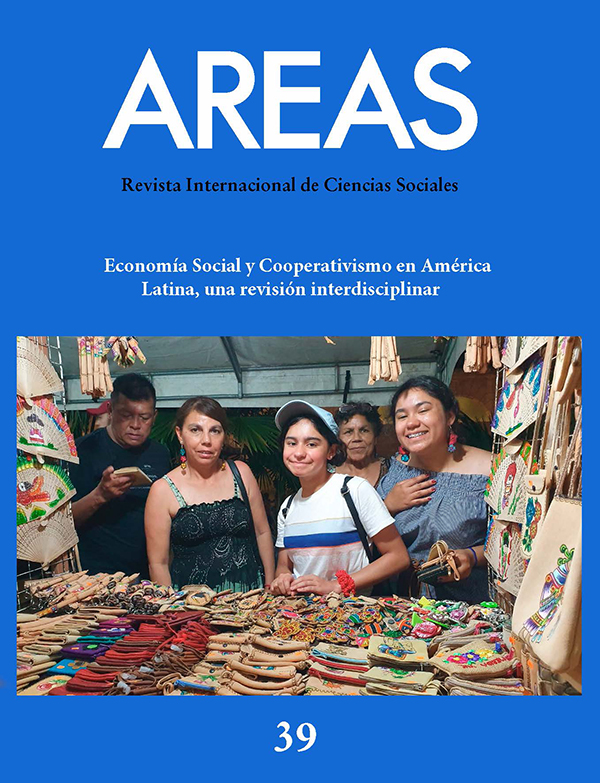Rural Development and Local Actors. Questions about an Institutional Organisation of Dynamic Economic Competition in Crisis: the case of SanCor in the Province of Santa Fe, Argentina
Abstract
The case study of SanCor Cooperativas Unidas Limitada is relevant due to several reasons. First of all, SanCor Cooperativas Unidas Limitada has got a big economic and social importance in the national milk production sector as well as in provincial towns located in the three major Argentine provinces: Santa Fe, Córdoba and Buenos Aires. Secondly, it is an example of an evolving organisational process going through different degrees: emerging as a second-degree co-operative society, a century after, it becomes a first-degree co-operative society, and finally, it disposes of almost all of its assets as well as its management to other companies of the dairy sector. Thirdly, its evolution verifies a hyothesis that had been stated long time ago about the results of one of the two possible evolution choices which could be carried out by the types of Everchanging Institutional Organisations, according to the co-operative societies typologies proposed by Lattuada and Renold (2004). Lastly, as a leading actor of territorial development, it ends up with an irreversible crisis scenario. Due to the big size reached by this organisation, the impact of its breakup, its disposal and its change in its cooperative society nature, it teaches us some lessons, and poses numerous questions about its effects on the dairy value chain as well as on the local development of those communities where it is inserted.
Downloads
-
Abstract969
-
pdf (Español (España))796
References
ANLLÓ, G.; BISANG, R. y SALVATIERRA, G. (eds.) (2010): Cambios estructurales en las actividades agropecuarias. De lo primario a las cadenas globales de valor, Buenos Aires, CAPAL-PROSAP.
BARSKY, O. y FERNÁNDEZ, L. (2008): Cambio Técnico y Transformaciones Sociales en el Agro Extrapampeano, Buenos Aires, Teseo.
BARSKY, O. y GELMAN, J. (2009): Historia del Agro Argentino. Desde la conquista has comienzos del siglo XXI, Buenos Aires, Sudamericana.
BENECKE, D. W. (1973): Cooperación y Desarrollo, Santiago de Chile, Ediciones Nueva Universidad, Universidad Católica de Chile.
BISANG, R.; ANLLÓ, G. y CAMPI, M. (2008): “Una revolución (no) tan silenciosa. Claves para pensar el Agro en Argentina”, Desarrollo Económico, 48, pp. 189-190.
FERNÁNDEZ, S.; LATTUADA, M. y RENOLD, J. M. (2004): “El cooperativismo en el complejo lácteo: evolución y estrategias recientes en el caso de la provincia de Santa Fe”, en RENOLD, J.M. y LATTUADA, M. (coords), El complejo lácteo en una década de transformaciones estructurales, Buenos Aires, Biblos.
LATTUADA, M. y RENOLD, J. M. (2004): El cooperativismo agrario ante la globalización, Buenos Aires, Siglo XXI.
LATTUADA, M.; NOGUEIRA, M. E.; RENOLD, J. M. y URCOLA, M. (2011a): “Mapa de situación del cooperativismo agropecuario argentino 2007”, Realidad Económica, 260, pp. 101-122.
LATTUADA, M.; NOGUEIRA, M. E.; RENOLD, J. M. y URCOLAa, M. (2011b): “El cooperativismo agropecuario argentino en la actualidad. Presentación y análisis de tres casos desde la perspectiva del capital social”, Mundo Agrario, 23, segundo semestre.
MATEO, Graciela (2011): “La Cooperativa Arroceros Villa Elisa, un buen ejemplo de la tradición cooperativista de Entre Ríos (Argentina)”, Mundo Agrario, vol.11, 22, ene-jun.
MOYANO ESTRADA, E. (2006): “Capital Social y desarrollo en zonas rurales”, en MANZANAL, M., NEIMAN, G. y LATTUADA, M. (comps.), Desarrollo rural, organizaciones e instituciones, Buenos Aires, CICCUS.
NOGUEIRA, M. E. (2008): Producción familiar en un régimen social de acumulación excluyente: el caso de tamberos en el departamento Iriondo al sur de Santa Fe (1991-2001), (Tesis de Maestría), Buenos Aires, FLACSO.
NUN, J. (1987): “La teoría política y la tradición democrática”, en NUN, J. y PORTANTIERO J.C., Ensayos sobre la transición democrática en Argentina, Buenos Aires, Puntosur.
RENOLD, J. M. (1995): Estructura y Organización cooperativa en el campo argentino. Un análisis antropológico-institucional, Rosario, Magíster.
RESSEL, A. B. y SILVA, N. C. (2008): Proyecto: impactos de la integración regional del MERCOSUR en el sector cooperativo. Estudio de Caso: SanCor Coop. Unidas Limitada, La Plata, Instituto de Estudios Cooperativos, Facultad de Ciencias Económicas, Universidad Nacional de La Plata.
SCHEJTMAN, A. y RAMÍREZ, E. (2004): Desarrollo Territorial Rural. Aspectos destacados de experiencias en América Latina, La Paz, Fondo Mink´a de Chorlaví.
VILLEGAS, R. (1979): “El papel de la empresa cooperativa en el proceso de desarrollo y el problema de la pérdida de participación de los asociados durante su crecimiento”, en VV.AA., Cooperativismo y Desarrollo, Buenos Aires, Intercoop.
WEBER, M. (1984): Economía y Sociedad, México, Fondo de Cultura Económica.
WOOLCOCK, M. (1998): “Social capital and economic development: Toward a theoretical synthesis and policy framework”, Theory and Society, 27 (2), pp. 151-208.
The published works by this Journal are subject to the following terms:
1. The Publication Service of the University of Murcia (the Editor) owns the copyright of its publications. It promotes and allows its use under the indicated licence in Section 2.
© Servicio de Publicaciones, Universidad de Murcia, 2011
2. Papers are digitally published under the licence Creative Commons Reconocimiento-NoComercial-SinObraDerivada 3.0 España (legal text). They can be copied, used, disseminated, transferred and publically presented if: i) the author is quoted, as well as the original source of publication (Journal, editorial and URL); ii) they are not used for commercial purposes; iii) the licence of use is mentioned.
3. Auto-file Conditions. It is allowed and authors are encouraged to digitally disseminate their pre-print versions (versions prior to review) and/or post-print (reviewed version accepted for its publication) since it promotes its early diffusion and the corresponding increase of quotes and scope within the academic community. RoMEO Colour: green.


